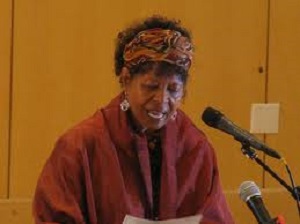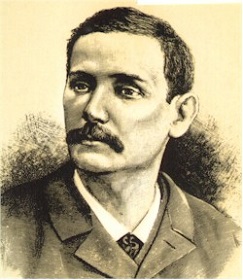De Amerikaanse dichteres en performster Jayne Cortez werd geboren op 10 mei 1936 in Fort Huachuca, Arizona. Zie ook alle tags voor Jayne Cortez op dit blog.
Jazz Fan Looks Back
I crisscrossed with Monk
Wailed with Bud
Counted every star with Stitt
Sang “Don’t Blame Me” with Sarah
Wore a flower like Billie
Screamed in the range of Dinah
& scatted “How High the Moon” with Ella Fitzgerald
as she blew roof off the Shrine Auditorium
Jazz at the Philharmonic
I cut my hair into a permanent tam
Made my feet rebellious metronomes
Embedded record needles in paint on paper
Talked bopology talk
Laughed in high-pitched saxophone phrases
Became keeper of every Bird riff
every Lester lick
as Hawk melodicized my ear of infatuated tongues
& Blakey drummed militant messages in
soul of my applauding teeth
& Ray hit bass notes to the last love seat in my bones
I moved in triple time with Max
Grooved high with Diz
Perdidoed with Pettiford
Flew home with Hamp
Shuffled in Dexter’s Deck
Squatty-rooed with Peterson
Dreamed a “52nd Street Theme” with Fats
& scatted “Lady Be Good” with Ella Fitzgerald
as she blew roof off the Shrine Auditorium
Jazz at the Philharmonic

De Italiaanse schrijver Roberto Cotroneo werd op 10 mei 1961 geboren in Alessandria. Zie ook alle tags voor Roberto Cotroneo op dit blog.
Uit: Letters to my son on the love of books (Vertaald door N. S. Thompson)
“In Treasure Island everything sails along with the wind astern and the seemingly wicked characters, the dreadful looking ones, disappear from the early chapters, deceiving everyone. You see, Francesco, when I read the book for the first time as a child I was afraid of the wrong people. My nightmare was meeting Blind Pew. You will be frightened when you come to the chapter called “The Black Spot.” Jim is a likeable boy who has lived a normal life without any great problems until, one day, a knock on the door brings the captain with his tarred pigtail, his sea-chest, his clasp-knife, and his frightening song:
“Fifteen men on the dead man’s chest—
Yo-ho-ho, and a bottle of rum!
Drink and the devil had done for the rest—
Yo-ho-ho, and a bottle of rum!”
It’s not a pleasant song, is it, Francesco? But pirates, real pirates, don’t play around. They’re cruel, so cruel as to appear stupid. They’re also weak and greedy, and among the worst people you could ever possibly meet. Jim must have become aware of this when he first met the man with “his hands ragged and scarred, with black, broken nails; and the sabre cut across one cheek, a dirty, livid white.” This is the old sea dog, Bill, or—as he calls himself—the “Captain.” Bill is a vagabond who sailed with Flint, the most feared pirate on the high seas, and he owns a very important map that shows the position of Flint’s treasure. Apart from the other pirates, no one knows of its existence, let alone Jim and his parents, who run the little inn called “The Admiral Benbow.”

De Engelse schrijfster Barbara Taylor Bradford werd geboren in Leeds, West Yorkshire op 10 mei 1933. Zie ook alle tags voor Barbara Taylor Bradford op dit blog.
Uit: Where You Belong
“My name is Valentine Denning, and I’m a New Yorker born and bred, but now I base myself in Paris, where I work as a photojournalist for Gemstar, a well-known international news-photo agency. With the exception of my grandfather, no one in my family ever thought I would become a photojournalist. When I was a child, Grandfather had spotted my desire to record everything I saw and bought me my first camera. My parents never paid much attention to me, and what I would do when I grew up never seemed to cross their minds. My brother Donald, to whom I was much closer in those days and tended to bully since he was younger, was forever after me to become a model, a job that held no attraction for me whatsoever. Donald kept pointing out that I was tall and slim, with long legs and an athletic build, as if I didn’t know my own body. I know I’m not pretty enough, but at least I don’t look too bad in the pictures Jake and Tony have taken of me. But I’m not much into clothes; I like T-shirts, khaki pants, white cotton shirts, and bush jackets, workmanlike clothes that are perfect for the life I lead.
I’m thirty-one years old, constantly traveling, living out of a suitcase, and then there are the crazy hours, the lack of comfort, even of the most basic of amenities, when I’m on the front lines covering wars and other disasters, not to mention the danger I often find myself facing. But I prefer this life to walking down a catwalk, showing off Paris couture. »

De Spaanse schrijver Benito Pérez Galdós werd geboren in Las Palmas op 10 mei 1843. Zie ook alle tags voor Benito Pérez Galdós op dit blog.
Uit: Doña Perfecta (Vertaald door Mary J. Serrano)
“Is there a restaurant or a bedroom in the station of Villahorrenda?” said the traveller to the man with the lantern.
“There is nothing here,” answered the latter brusquely, running toward the men who were putting the freight on board the cars, and assuaging them with such a volley of oaths, blasphemies, and abusive epithets that the very chickens, scandalized by his brutality, protested against it from their baskets.
“The best thing I can do is to get away from this place as quickly as possible,” said the gentlemen to himself. “The conductor said that the beasts were here.”
Just as he had come to this conclusion he felt a thin hand pulling him gently and respectfully by the cloak. He turned round and saw a figure enveloped in a gray cloak, and out of whose voluminous folds peeped the shrivelled and astute countenance of a Castilian peasant. He looked at the ungainly figure, which reminded one of the black poplar among trees; he observed the shrewd eyes that shone from beneath the wide brim of the old velvet hat; the sinewy brown hand that grasped a green switch, and the broad foot that, with every movement, made the iron spur jingle.
“Are you Senor Don Jose de Rey?” asked the peasant, raising his hand to his hat.
“Yes; and you, I take it,” answered the traveller joyfully, “are Dona Perfecta’s servant, who have come to the station to meet me and show me the way to Orbajosa?”
“The same. Whenever you are ready to start. The pony runs like the wind. And Senor Don Jose, I am sure, is a good rider. For what comes by race—”

De Duitse dichter,schrijver, pedagoog en theoloog Johann Peter Hebel werd geboren op 10 mei 1760 in Basel. Zie ook alle tags voor Johann Peter Hebel op dit blog.
Uit: Unglück der Stadt Leiden
„Diese Stadt heißt schon seit undenklichen Zeiten Leiden, und hat noch nie gewußt, warum, bis am 12. Jänner des Jahrs 1807. Sie liegt am Rhein in dem Königreich Holland, und hatte vor diesen Tagen eilftausend Häuser, welche von 40 000 Menschen bewohnt waren, und war nach Amsterdam wohl die größte Stadt im ganzen Königreich. Man stand an diesem Morgen noch auf, wie alle Tage; der Eine betete sein „Das walt Gott”, der andere ließ es sein, und niemand dachte daran, wie es am Abend aussehen wird, obgleich ein Schiff mit siebenzig Fässern voll Pulver in der Stadt war. Man aß zu Mittag und ließ sich’s schmecken, wie alle Tage, obgleich das Schiff noch immer da war. Aber als Nachmittags der Zeiger auf dem großen Turm auf halb fünf stand, – fleißige Leute saßen daheim und arbeiteten, fromme Mütter wiegten ihre Kleinen, Kaufleute gingen ihren Geschäften nach, Kinder waren beisammen in der Abendschule, müßige Leute hatten lange Weile, und saßen im Wirtshaus beim Kartenspiel und Weinkrug, ein Bekümmerter sorgte für den ändern Morgen, was er essen, was er trinken, womit er sich kleiden werde, und ein Dieb steckte vielleicht gerade einen falschen Schlüssel in eine fremde Türe, – und plötzlich geschah ein Knall. Das Schiff mit seinen siebenzig Fässern Pulver bekam Feuer, sprang in die Luft, und in einem Augenblick (ihr könnt’s nicht so geschwind lesen, als es geschah), in einem Augenblick waren ganze lange Gassen voll Häuser mit allem, was darin wohnte und lebte, zerschmettert und in einen Steinhaufen zusammengestürzt oder entsetzlich beschädigt. Viele hundert Menschen wurden lebendig und tot unter diesen Trümmern begraben oder schwer verwundet. Drei Schulhäuser gingen mit allen Kindern, die darin waren, zu Grunde; Menschen und Tiere, welche in der Nähe des Unglücks auf der Straße waren, wurden von der Gewalt des Pulvers in die Luft geschleudert, und kamen in einem kläglichen Zustand wieder auf die Erde. Zum Unglück brach auch noch eine Feuersbrunst aus, die bald an allen Orten wütete, und konnte fast nimmer gelöscht werden, weil viele Vorratshäuser voll Öl und Tran mit ergriffen wurden.“

Cover
Zie voor nog meer schrijvers van de 10e mei ook mijn vorige blog van vandaag.
